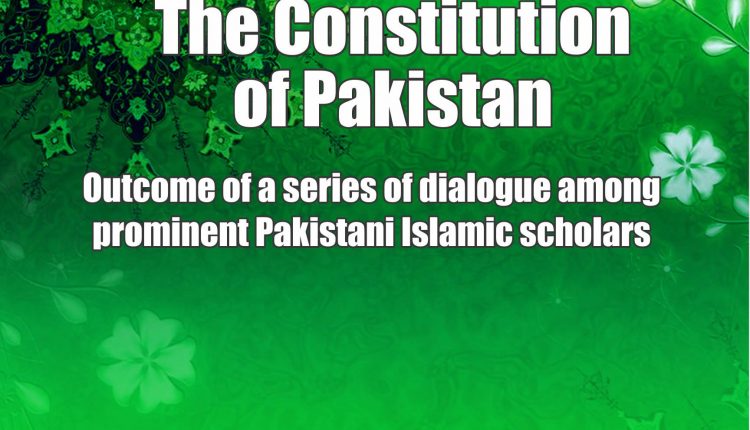Islam, Democracy and the Constitution of Pakistan


- After Study Hours: Exploring the Madrassah Mindset
- Education for peace and harmony
- Reconstruction of the National narratives and Counter-Violent Extremism Model for Pakistan
- Role of Post-Noon Engagements of Madrassa Students in Radical Orientation
- Promoting Inclusive and Tolerant Educational Narratives
- Islam, Democracy and the Constitution of Pakistan
- Minority Rights in Pakistan: Historic Neglect or State Complicity?
- “Creating an environment that counteracts militant ideologies and radicalism in Pakistan”
- Through Each Other’s Eyes
- The Role of Ulema in Promotion of Peace and Harmony in Society
- Critical Ideologies: A Debate on Takfeer & Khurooj
- سماجی ہم آہنگی ، رواداری اور تعلیم
- سماجی ہم آہنگی کیسے ہو؟
- اسلام جمہوریت اور آئین پاکستان
- پر امن اور متوازن معاشرے کے قیام میں علماء کا کردار
- اسلام جمہوریت اور پاکستان
- ایک دوسرے کے نظر سے
- مسئلہ تکفیر و خروج
- Media Safety in Pakistan
- محفوظ اور ہم آہنگ پاکستان
- Reconstruction of the national narratives and counter-violent extremism model for pakistan
- Secure and Inclusive Pakistan
- تعلیم امن اور ہم آہنگی
- Regulating Broadcast Media: Challenges & Reforms
- Pakistan’s Sectarian Mire & The Way Forward
- Dialogue Pakistan 2019 report
- Pakistan’s achievements in war on terror but at what cost: a special review of the current decade
- Pakistan in changing world order
- Who Am I
- Academic and Intellectual Dialogue on Social Harmony, Tolerance and Education
- Youth Engagement in Pakistan: Baseline Evaluation and Way Forward
- Dialogue Pakistan 2020
- Strengthening Governance in Pakistan
- Youth Perspective on Society, Religion, And Politics
- Supporting the Afghan peace process: Pakistan’s position, interests and policy options
- Afghanistan as Seen from Pakistan I
- Afghanistan as Seen from Pakistan II
- Perspectives from Pakistan on Afghan peace and reconciliation 1
- Discourse with Balochistan Youth on Society, Religion, and Politics
- Perspectives From Pakistan on Afghan Peace and Reconciliation 2
- How Youth in Sindh View State, Religion and Politics
- Afghan Peace and Reconciliation: Pakistan’s Interests and Policy Options II
- Interfaith Relations in Pakistan Perspectives and Worldview of Youth in Punjab
- Afghanistan as Seen from Pakistan III
- Making Sense of Pakistani Youth How Youth in Pakistan View State, Society, Religion, and Politics
- PERSPECTIVES FROM PAKISTAN ON AFGHAN PEACE AND RECONCILIATION 3
- AFGHAN PEACE AND RECONCILIATION: PAKISTAN'S INTERESTS AND POLICY OPTIONS 3
- A Path to Peace
- Countering Violent Extremism on Campuses A Faculty-Oriented Policy Brief
- PERSPECTIVES FROM PAKISTAN ON AFGHAN PEACE AND RECONCILIATION 4
- Afghanistan as Seen from Pakistan IV
- AFGHAN PEACE AND RECONCILIATION: PAKISTAN’S INTERESTS AND POLICY OPTIONS 4
- Afghanistan as Seen from Pakistan V
- AFGHAN PEACE AND RECONCILIATION: PAKISTAN’S INTERESTS AND POLICY OPTIONS 5
- PERSPECTIVES FROM PAKISTAN ON AFGHAN PEACE AND RECONCILIATION 5
- Charter of Peace
- AFGHAN PEACE AND RECONCILIATION: PAKISTAN'S INTERESTS AND POLICY OPTIONS VI
- AFGHANISTAN AS SEEN FROM PAKISTAN-VI
- PERSPECTIVES FROM PAKISTAN ON AFGHAN PEACE AND RECONCILIATION 6
- Youth for interfaith harmony Newsletter 1
- AFGHAN PEACE AND RECONCILIATION: PAKISTAN’S INTERESTS AND POLICY OPTIONS
- PERSPECTIVES FROM PAKISTAN ON AFGHAN PEACE AND RECONCILIATION 7
- AFGHANISTAN AS SEEN FROM PAKISTAN-VII
- YOUTH AND THE SOCIAL CONTRACT IN PAKISTAN
- Pakistan’s Afghan perspective and policy options
- Charter of Peace
- PERSPECTIVES FROM PAKISTAN ON AFGHAN PEACE AND RECONCILIATION 8
- AFGHANISTAN AS SEEN FROM PAKISTAN-VIII
- AFGHAN PEACE AND RECONCILIATION: PAKISTAN'S INTERESTS AND POLICY OPTIONS 8
- AFGHAN PEACE AND RECONCILIATION: PAKISTAN’S INTERESTS AND POLICY OPTIONS 9
- AFGHAN PEACE AND RECONCILIATION: PAKISTAN'S INTERESTS AND POLICY OPTIONS - 11
- Pakistan's Evolving Militant Landscape: State Responses and Policy options
- AFGHAN PEACE AND RECONCILIATION: PAKISTAN’S INTERESTS AND POLICY OPTIONS – 12
- TRENDLINES OF PAKISTAN'S SECURITY CHALLENGES
Over the past four years, Pak Institute for Peace Studies (PIPS) has engaged Pakistan’s leading religious scholars belonging to all schools of thought in a series of academic and intellectual dialogue to discuss critical challenges facing Pakistan and suggest their solutions. Another underlying objective of these dialogues has been to develop some consensual responses on the legal or jurisprudential aspects of the issues linked to religious extremism and militancy and create awareness among the people about that. Apart from that, the Institute has been serving as a platform to promote sectarian and interfaith harmony by holding structural dialogues among representatives of different segments of Pakistani society including religious leaders and scholars from all faiths and sects, political analysts and leaders, social scientists, media practitioners, and civil society and human rights activists, etc. PIPS has also been employing an element of dialogue to enhance interaction between students of madrassas and mainstream educational institutions so that they are able to exchange views and remove mutually held misperceptions about each other. In 2011-12, Pak Institute for Peace Studies held four structured dialogues among leading religious scholars from all schools of thought on the concepts of takfeer and khurooj. Some of the findings, as listed below, revealed that Pakistan’s religious scholars and leaders have confused and divided views about Pakistan’s Constitution and democratic system.

